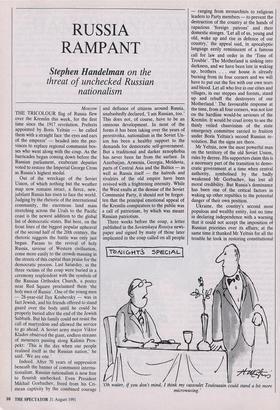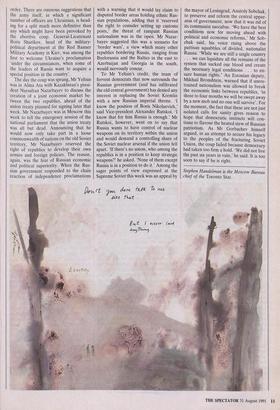RUSSIA RAMPANT
Stephen Handelman on the threat of unchecked Russian nationalism
Moscow THE TRICOLOUR flag of Russia flew over the Kremlin this week, for the first time since the 1917 revolution. Prefects appointed by Boris Yeltsin — he called them with a straight face 'the eyes and ears of the emperor' — headed into the pro- vinces to replace regional communist bos- ses who went along with the coup. As the barricades began coming down before the Russian parliament, exuberant deputies voted to restore the Imperial George Cross as Russia's highest medal.
Out of the wreckage of the Soviet Union, of which nothing but the weather map now remains intact, a fierce, new, jubilant Russia has risen to face the world. Judging by the rhetoric of the international community, the enormous land mass stretching across the Urals to the Pacific coast is the newest addition to the global list of democratic states. But here, on the front lines of the biggest popular upheaval of the second half of the 20th century, the rhetoric suggests the battle was only just begun. Paeans to the revival of holy Russia, saviour of Western civilisation, come more easily to the crowds massing in the streets of this capital than praise for the democratic process. Last Saturday, as the three victims of the coup were buried in a Lzremony resplendent with the symbols of the Russian Orthodox Church, a poster near Red Square proclaimed them 'the holy men of Russia'. One of the young men — 28-year-old Ilya Krishevsky — was in fact Jewish, and his friends offered to stand guard over the body until he could be properly buried after the end of the Jewish Sabbath. But his family could not resist the call of martyrdom and allowed the service to go ahead. A Soviet army major Viktor Kladov observed the giant, endless streams of mourners passing along Kalinin Pros- pekt: 'This is the day when our people realised itself as the Russian nation,' he said. 'We are one.'
Indeed. After 70 years of suppression beneath the banner of communist interna- tionalism, Russian nationalism is now free to flourish unchecked. Even President Mikhail Gorbachev, freed from his Cri- mean captivity by the combined courage and defiance of citizens around Russia, unabashedly declared, 'I am Russian, too.' This does not, of course, have to be an ominous development. In most of the forms it has been taking over the years of perestroika, nationalism in the Soviet Un- ion has been a healthy support to the demands for democratic self-government. But a traditional and darker xenophobia has never been far from the surface. In Azerbaijan, Armenia, Georgia, Moldavia, parts of Central Asia and the Baltics — as well as . Russia itself — the hatreds and rivalries of the old empire have been revived with a frightening intensity. While the West exults at the demise of the Soviet Communist Party, it should not be forgot- ten that the principal emotional appeal of the Kremlin conspirators to the public was a call of patriotism, by which was meant Russian patriotism. Three weeks before the coup, a letter published in the Sovietskaya Rossiya news- paper and signed by many of those later implicated in the coup called on all people — ranging from monarchists to religious, leaders to Party members — to prevent the destruction of the country at the hands of rapacious 'foreign patrons' and their domestic stooges. 'Let all of us, young and old, wake up and rise in defence of our country,' the appeal said, in apocalyptic language eerily reminiscent of a famous call for law and order in the 'Time of Trouble'. 'The Motherland is sinking into darkness, and we have been late in waking up, brothers . . . our house is already burning from its four corners and we will have to put out the fire with our own tears and blood. Let all who live in our cities and villages, in our steppes and forests, stand up and rebuff the destroyers of our Motherland.' The favourable response at the time, from all four corners, was not lost on the hardline would-be saviours of the Kremlin. It would be cruel irony to see the thinly veiled chauvinism of the state emergency committee carried to fruition under Boris Yeltsin's second Russian re- volution. But the signs are there.
Mr Yeltsin, now the most powerful man on the territory of the old Soviet Union, rules by decree. His supporters claim this is a necessary part of the transition to demo- cratic government at a time when central authority, symbolised by the badly weakened Mr Gorbachev, has lost all moral credibility. But Russia's dominance has been one of the critical factors in waking up other republics to the potential danger of their own position.
Ukraine, the country's second most populous and wealthy entity, lost no time in declaring independence with a warning that it could not accept the imposition of Russian priorities over its affairs; at the same time it thanked Mr Yeltsin for all the trouble he took in restoring constitutional 'Oh waiter, if you don't mind, I think my cassoulet Toulousain could stand a bit more microwaving.' order. There are ominous suggestions that the army itself, in which a significant number of officers are Ukrainian, is head- ing for a split much more definitive than any which might have been provoked by the abortive coup. General-Lieutenant Boris Sharikov, head of the military- political department at the Red Banner Military Academy in Kiev, was among the first to welcome Ukraine's proclamation 'under the circumstances, when some of the leaders of Russia want to acquire a special position in the country'. The day the coup was sprung, Mr Yeltsin was in Alma Ata with Kazakhstan's presi- dent Nursultan Nazarbayev to discuss the creation of a joint economic market be- tween the two republics, ahead of the union treaty planned for signing later that week. Mr Nazarbayev was in Moscow this week to tell the emergency session of the national parliament that the union treaty was all but dead. Announcing that he would now only take part in a loose commonwealth of nations on the old Soviet territory, Mr Nazarbayev reserved the right of republics to develop their own armies and foreign policies. The reason, again, was the fear of Russian economic and political superiority. When the Rus- sian government responded to the chain reaction of independence proclamations with a warning that it would lay claim to disputed border areas holding ethnic Rus- sian populations, adding that it 'reserved the right to consider setting up customs posts,' the threat of rampant Russian nationalism was in the open. Mr Nazar- bayev suggested this was a scenario for 'border wars', a view which many other republics bordering Russia, ranging from Byelorussia and the Baltics in the east to Azerbaijan and Georgia in the south, would nervously concur.
To Mr Yeltsin's credit, the team of fervent democrats that now surrounds the Russian government (and has infiltrated the old central government) has denied any interest in replacing the Soviet Kremlin with a new Russian imperial throne. 'I know the position of Boris Nikolaevich,' said Vice-president Alexander Rutskoi. 'I know that for him Russia is enough.' Mr Rutskoi, however, went on to say that Russia wants to have control of nuclear weapons on its territory within the union and would demand a controlling share of the Soviet nuclear arsenal if the union fell apart. 'If there's no union, who among the republics is in a position to keep strategic weapons?' he asked. 'None of them except Russia is in a position to do it.' Among the sager points of view expressed at the Supreme Soviet this week was an appeal by the mayor of Leningrad, Anatoly Sobchak, to preserve and reform the central appar- atus of government, now that it was rid of its communist succubus. 'We have the best conditions now for moving ahead with political and economic reforms,' Mr Sob- chak said, his voice rising above the partisan squabbles of divided, nationalist Russia. 'While we are still a single country . . we can liquidate all the remains of the system that sucked our blood and create the necessary legal conditions . . . to en- sure human rights.' An Estonian deputy, ' Mikhail Bronshtein, warned that if unres- trained nationalism was allowed to break the economic links between republics, 'in three to four months we will be swept away by a new mob and no one will survive'. For the moment, the fact that these are not just isolated calls for sanity gives reason to hope that democratic instincts will con- tinue to flavour the heated stew of Russian patriotism. As Mr Gorbachev himself argued, in an attempt to secure his legacy to the peoples of the fracturing Soviet Union, the coup failed because democracy had taken too firm a hold. 'We did not live the past six years in vain,' he said. It is too soon to say if he is right.
• Stephen Handelman is the Moscow Bureau ,chief of the Toronto Star.











































 Previous page
Previous page